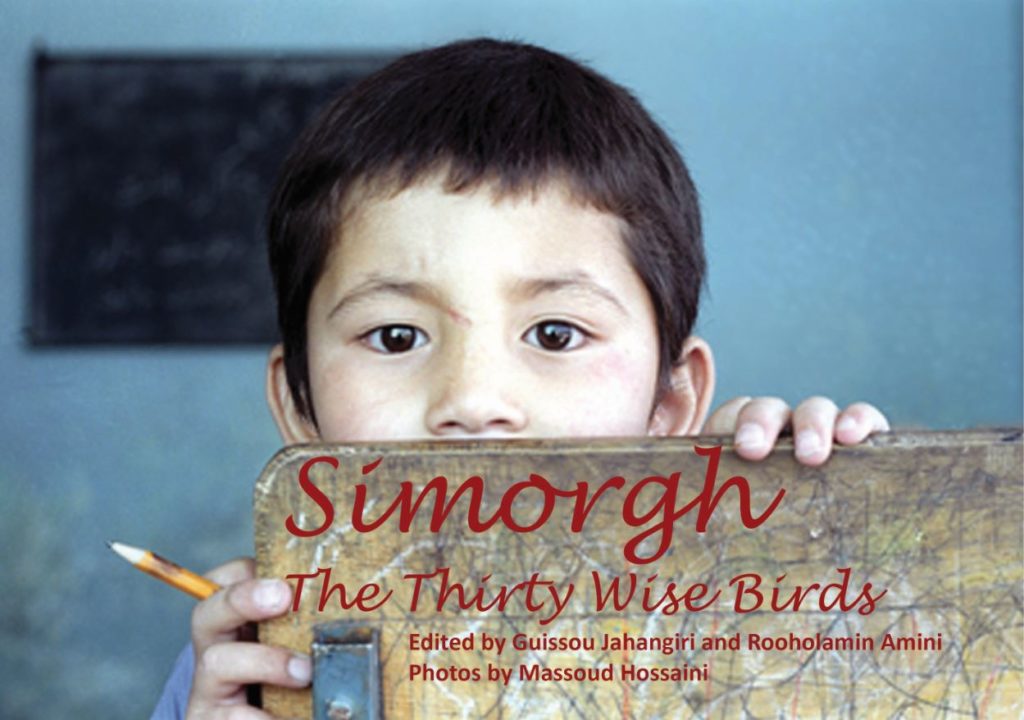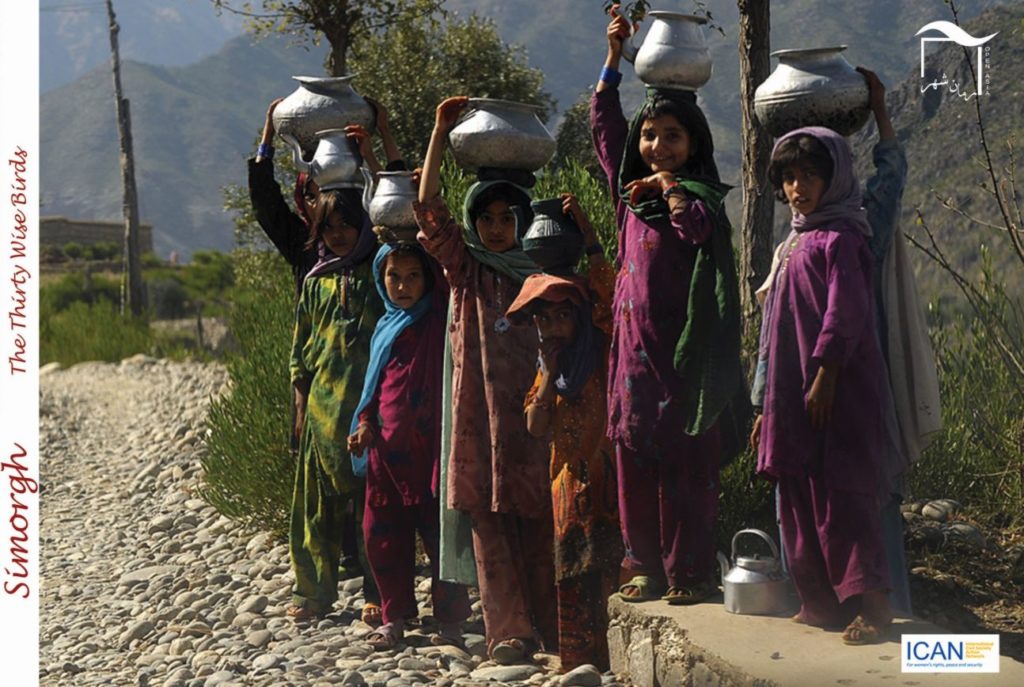
I wish that grapes ripened
the world became drunk
Streets stumbled
presidents and beggars,
brushed against each other.
I wish that borders became drunk
and Mohammad Ali could see his mother after 17 years
Ameneh could touch her child after 17 years.
I wish that grapes ripened
Amu River would gush forth his finest sons
Hindu Kush would free her daughters.
For a moment
Guns would forget to tear apart
Knives, to slit open
Pens would write “fire”
as “Ceasefire”…
Alyas Alavi (laureate of Armanshahr 2012 Simorgh Peace Prize)
The International Simorgh Peace Prize was established by Armanshahr/OPEN ASIA on International Peace Day, 15 September 2009, calling for “365 days of peace, not a day less but a day more”. The Prize has been awarded, every 30 months, to outstanding women and men; cultural activists, artists and civic initiatives for peace, human rights and freedom in the Heart of Asia.
The legend of Simorgh, a well known mythical bird, similar to the phoenix, is told in the 12th Century Conference of the Birds, a poem in Persian by Farid ud-Din Attar of Nishapour. It is about a perilous journey made by the birds of the world in search of the fabulous bird, Simorgh, who lives on top of Mount Qaaf. Simorgh has an answer for every question and its feathers grant any wish. The birds are unable to endure the journey, and one by one, drop out, each offering an excuse. Many perish during this quest. Eventually, only thirty birds reach the mountain. When appearing before Simorgh they see themselves. They are the Simorgh and Simorgh is the thirty birds (this story relies on a clever word play between the words Simorgh and «Si-morgh»- meaning «thirty birds» in Persian). The thirty birds seeking the Simorgh realise that Simorgh is nothing more than their transcendent totality.
Four rounds of Simorgh Prize and Armanshahr/OPEN ASIA
In the first round of the International Simorgh Peace Prize, poets and writers working for peace by combating war and violence through literature received the awards. In the second round, it was the turn of books, safe locations for them and independent publishers who bear the hardship of publishing in order to transmit knowledge, to receive the awards. In the third round, the awardees were musicians from Afghanistan, Iran and Tajikistan who aim at sowing the seeds of peace and affection and substitute their voice for the rattling of guns and despotism. In 2015 women who have stood up against injustice and intolerance; who are role models for the young people of the region and whose lives serve equality, justice and freedom of the entire society were rewarded.
The Simorgh Prize is part of a larger initiative led by Armanshahr/OPEN ASIA to collect and reproduce oral histories and people’s narrations of war, support victims of violence, contribute to a just peace. If violence is to end in Afghanistan and the region, history needs to be told through the eyes of those who have lost their loved ones and fallen victim to violence and oppression during the last decades. Instability has not only deprived the people of the opportunity for growth and development. It has, in most cases denied people the chance to express their suffering, tell their stories and seek justice. In this civilisation where poetry occupies a unique place, the Simorgh initiative created premises for collecting individual life stories that could grow to a collective experience with multiple voices.
The International Simorgh Peace prize builds on previous successful international initiatives launched by Armanshahr/OPEN ASIA since 2001. The first of these was the Call for a “Caravan of 1001 poems for Peace and democracy in Afghanistan”, featuring more than 900 works from 45 countries. This ambitious campaign led to the organisation of “One Week for Afghanistan” at UNESCO headquarters in Paris under the auspices of the UNESCO Secretary General in 2003. This included the staging of a play “Caravan of Peace: Destination Afghanistan” based on the poems and an international photo exhibition. Five anthologies of poems from the Caravan were published by Armanshahr/OPEN ASIA in three languages in Afghanistan, France and Tajikistan. This paved the way for a second initiative; the publication of a collection of international poems by women for peace in Afghanistan entitled “Women Celebrate Peace”, in 2008. A play The Simorgh Peace was staged in Tajikistan in 2012 with actors from the region based on collected poems and texts depicting war and promising a peace of the just.

Simorgh : the Thirty Wise Birds presents 20 photographs of the 2012 Pulitzer Prize winner, Massoud Hossaini (Agence France-Presse) taken from around the country between 2002-2010 depicting people and war. Also a, anthology of poems translated into English chosen from among 1,000 works, verse and prose promoting peace and rejecting war that have been submitted to Armanshahr/OPEN ASIA from confirmed and citizen-poets from Afghanistan, Iran and Tajikistan. This was an enthusiastic response to a Call for contributions launched by the organization in 2009 for poetry, prose and life histories refuting war, torture and militarism. It aimed to collect the memories of ordinary citizens as no society can live in the shadow of amnesia.
The present book is the fruit of collective work and we are indebted to Massoud Hossaini for his photographs, Khalil Rostamkhani for co-translating into English, Lara Griffith, Amir Jahanguiri and Margot Douaihy for having enriched and edited the poems.
We would like to repeat what Zahra Zahedi tells us in her poem:
Let’s hold hands
Dissolve the world in this encounter
Bring your toys
Let’s break the missile
Discard the gun
Let’s sing
Guissou Jahangiri and Rooholamin Amini
Spring 2016
If you wish to order “Simorgh; the Thirty Wise Birds”, Contact us: armanshahrfoundation.openasia@gmail.com

